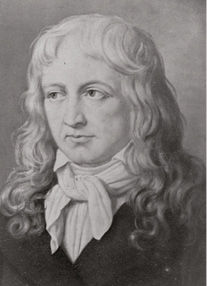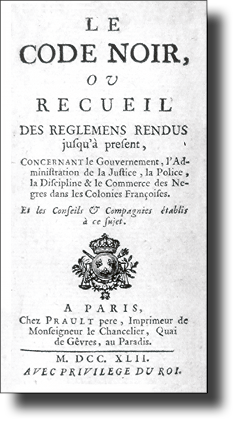33. Jacques-Henri Bernardin de Saint-Pierre (1737-1814), ‘Reflections on Slavery’, from A Voyage to the Island of Mauritius, 177352

After his stay on the Île de France (as Mauritius was formerly known), the setting for his novel Paul et Virginie, Bernardin de Saint-Pierre wrote a record of his travels in which he gives an eye-witness account of slavery and its inhumanity.53
I know not whether coffee and sugar are necessary for Europe’s fortune, but I know for certain that these two plants have been disastrous for two parts of the world. America has been depopulated in order to make space for them to grow; Africa is being depopulated in order to get people to farm them […]. A land owner would be comfortably off with twenty farmers, he is poor with twenty slaves. They number twenty thousand here, one eighteenth of whom have to be replaced each year. Left to itself, therefore, the colony would die after eighteen years, so true is it that there can be no repopulation without freedom and property, and that injustice is a bad manager.
It is said that the Code Noir or Slave Code54 is conceived for their benefit. That may be so: but the harshness of the masters exceeds the permitted punishments, while their avarice withholds the food, rest and rewards they owe. And if these wretched people wished to complain, to whom might they complain? Their judges are frequently those who were tyrannising over them in the first place.

Title page of Le Code Noir, 1742 edition: https://commons.wikimedia.org/wiki/File:Le_Code_Noir_1742_edition.jpg
But, it is said, this slave people can be controlled only with very great harshness; it takes torture, three-hooked iron collars, whips, blocks to which they are tied by their feet, chains which grip them by the neck; they must be treated like animals so that the whites may live like men. Oh, I know all too well that once a thoroughly unjust principle is established, all its consequences will be most inhumane.
It was not enough that these wretches should be given up to the greed and cruelty of the most depraved of men, they had also to be the plaything of their owners’ sophistry.
Theologians aver that in exchange for slavery on earth, they are rewarded with freedom of the spirit. But most of them are bought at an age where they can never learn French, and the missionaries do not learn their language. In any case, those who are baptised are treated in the same way as the others.
They add that they have merited punishment from on high by selling one another. Is it then for us to be their torturers? Let us leave it to the vultures to destroy the kites.
Politicians have condoned slavery, saying it was justified by war. But it is not the blacks who are fighting us. I concede that the laws of man permit it; we should at least remain within the bounds they set.
It angers me to see that the philosophers who so bravely fight against abuses have barely mentioned the slavery of the blacks except to make jokes about it. They look away, into the distance. They speak about the Saint Bartholomew’s Day massacre, and the slaughter of the Mexicans by the Spaniards, as if this crime were not still being committed now, by half of Europe. Is it worse suddenly to kill people whose opinions differ from our own than to persecute a whole nation to whom we owe our luxuries? The lovely rose and flame colours in which our ladies dress, the cotton with which they trim their gowns, the sugar, coffee and chocolate for their breakfast, the rouge they use to set off their pallor, all this is prepared for them by the hands of wretched black people. Women of feeling, you weep at tragedies, yet those things which bring you pleasure are drenched with human tears and tainted with blood!
Read the free original text online (facsimile), 1773 edition: http://gallica.bnf.fr/ark:/12148/bpt6k1019923
52 Jacques-Henri Bernardin de Saint-Pierre, ‘Réflexions sur l’esclavage’, in his Voyage à l’Île de France, Amsterdam: 1773, p. 201.
53 Portrait of Bernardin de Saint-Pierre by Ernst Hader: https://commons.wikimedia.org/wiki/File:Bernardin_de_Saint-Pierre_by_Ernst_Hader.jpg
54 The ‘Code Noir’ or Slave Code, first enacted in law by Louis XIV in 1685, establishes the laws regulating the ‘rights’ of slaves, which included marriage (although only between slaves, and only with the permission of the owner) and the right not to have families divided. It also establishes the penalties permitted by law for punishing slaves.







